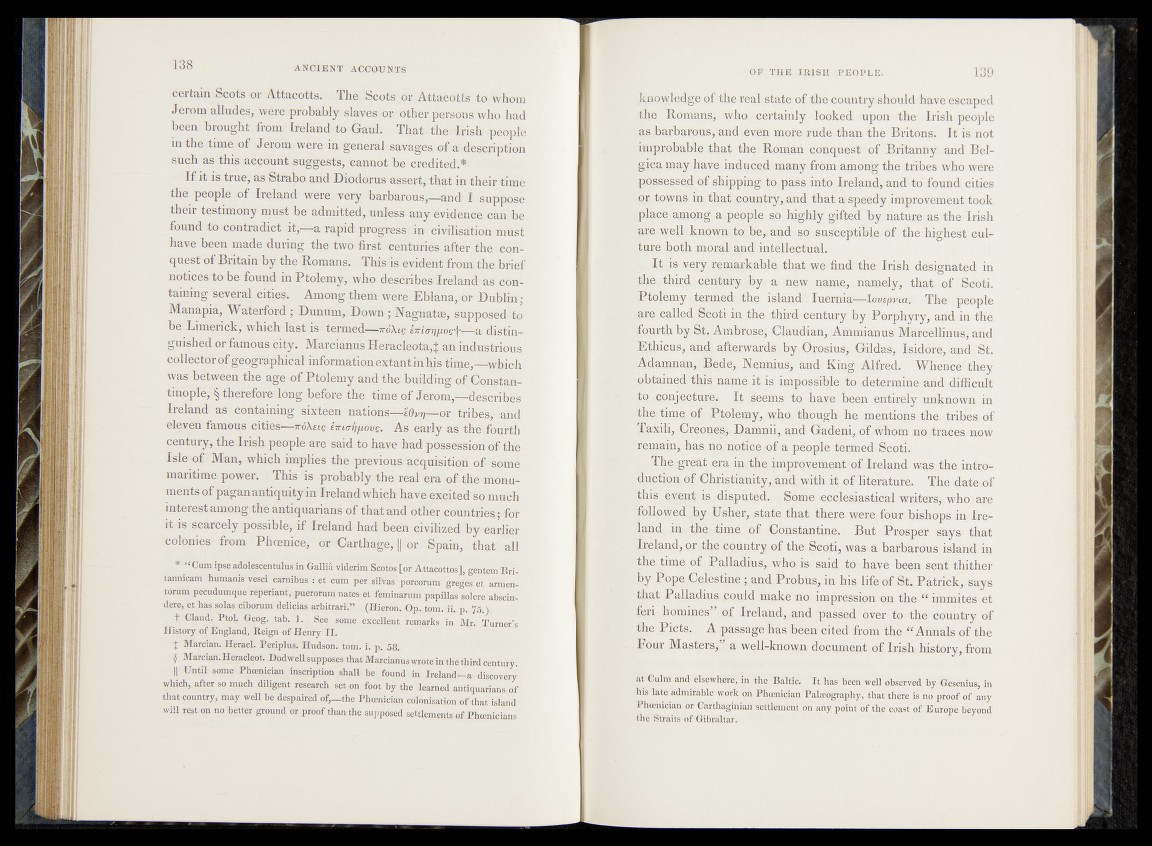
certain Scots .or Attacotts. The Scots or-Attacotts to whom
Jerom alludes, were probably slaves, or other persons who had
been brought Jrom Ireland toQaul. That th e ir is h people
in the time of Jerom were in general savages of a description
such as this account suggests, eannot be credited;*
If itis true, as Strabo and Diodorus assert, that in their time
the people of-Ireland were.very barbarous,—and I suppose
their testimony must be admitted, unless any evidence-can be
found to contradict i t , ^ a rapid progress 'in civilisation must
have been made during.the two first-"centuries after the conquest
of Britain by the Romans; This is evident from the brief
notices to be found in Ptolemy, who describes Ireland as containing
several cities. $ Among them were Eblaha, or' BuMha;
Manapia, Waterford ; Dunum, Down-; Nagnatae^gupposed to
be Limerick, which last .is termed—xoXtg distinguished
or famous city. MarcianusHeracleota^ an industrious
collector o#geographical information extant in hjs time,—which
Iwas between the age of Ptolemy and the building"of Coh|tan-
tinople,§ therefore long before the time of d^rom,—d e sS b e i
Ireland as containing sixteen nations—ed^ —or tribi§fir and
eleven famous cities—Kotet&MrwrriiJiovg* As early as the fourth
century, the Irish people are said to have had possession of the
Isl©of Man, which implies the previous acquisition of some
maritime power. This is -probably- the real era bf the-monu-
mentsof pagan antiquity in Irelandwhich have excitedtso much
interest among the antiquarians of that and otlier.countries; for
it is scarcely possible, if Ireland had been civilfeed%y e ak e r
colonies- from. Pbcenic^ or Carthage, || or Spain, that' all
* ‘c Cum ipse adolescentulus in Gallia viderim Scotos [or Attacottos], gentem Bri-
tannicam humanis vesd camibus : et cuta per silvas porcorum greges et armetr-
torum pecudumque reperiant, puerorum nates et feminarnm papillas solere abscin-
dere, et has solas ciborum delicias arbitrari.” (Hieron. Op .tom, ii. p. 75.).
t Claud. PtoL Geog. tab. 1. See some excellent remarks in Mr. Turner's
History of England, Reign of Henry II.
X Marcian. Herael. Periplus. Hudson, tom. i, p. 58.
; § Marcian. Heracleot. DodweRsupposes that Marcianuswrote in the third century .
It Until some Phoenician inscription shall he found in Ireland—a discovery
which, after so much diligent-research set op foot hy the learned antiquarians of
that country, may well be despaired of,—the Phoenician colonisation of that island
will rest on no better ground or proof than the supposed settlements of Phoenicians
•knowledge of the real state of the country should have escaped
-••Rd]xii^ns,^/^hc®cef.tainly. looked .utpon the Irish people
as barbarous, and^eVen morejjryde thap^the Britons. I t is not
improbably Roman - ^ q u e s t- of Britanny and Befegica
Riay ha^e induced many from among the tribes who were
of shipping to pass info Ireland, and tq found cities
yr towns ip that^pufutryand that at'&pf'e.dy improvement took
ipfece,. amopg,:Rap^pteilpvhig,h]yl giftjedby nature.,as the Irish
are wfelj known to^he, and Susceptible; of the Si^hesticul-
K fee both moral and
I t .is vesry remarkable th,at find fhe Irish-! designated in
the .third; ^epfury^ by ,a, njw n ame,,namely^ that ^ f ^ c o f i.
P ' i ®l l u e f mi— . The people
p^e (Called^m^i^in the thir^^ i^fur^ ftj^Porphyry, and in the
fourth by ^^liSbsrpil^f^laudian, Ammi'ahuS^MareClhr!^| and
apfdr fo rw a rd s ^ y O ^ s if ^ (^[da,^, dsi<Mrh,;and|?Sti
|Adamnan, Bed^p.^nnius, and, King.Alfred. . Whence'they
^b ta inedjjys n ^ ^ i ^ i s im|$|rif}le to id^tmjmihejiand difficult
$Q? ;CO|_rj(^ u ^ . y , Itigepm^ tQ have beeu. entirely, unknown in
§t%. tiu f^ ^ ^ l|t|)lem y , who fih.^gb,he mentions the tribq&df
faxili^ Qpeo^i^,. Damnii, and f^adynij,pf-whom n^pape^now
remain, has,.p.Q„n°tit^9X-.a; peoplej^e^p4>SpPt|^4 “r
The great era im thy(>miprqye.me,nt of Ireland was fbqintror
K K | | of Christianity, a,nd with it of hti^atpfte;,f The da^te^of
is..di^pute.d||‘i Some-'ecclesiastical- writers, who.are
.followed by Usher, state that, there. wOTA''fo;UT?b%hpippin Ireland,
in the time of Cons tan tiny. But Prosper spys that
Iceland? oj, tl^ei^pnotry of thec^epfi,, was a barbarous island in
the time ©f Palladius^ whc^isi said, to have been sent thither
Bope^Cefestine; and, Prqtius* in his life of St. P a tr ic J ^ y g ,
that Palladium pould make no impression on the “ immite,S\et
feri' homines . of Ireland,, and passed, over to ffhe>,C,Ojiintry dp
the Piets.’ A passage has been cited from the «Annals of thj§
Four Masters,” a well-known document of Irish history, from
kt Culm and elsewhere, in the Baltic. I t has been well observed, by Gesenius, in
his late adthirahle wbrk on Bhcenician Palaeography, that there‘is: no proof of any
Phoenician of Gafthaginian settlement on any point of the coasbof Europe .beyond
the Straits of Gibraltar.